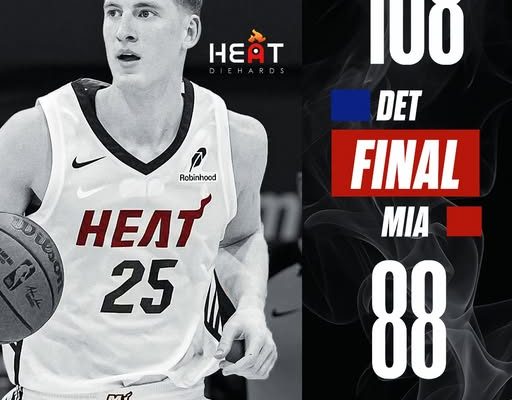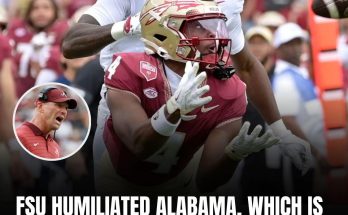The Miami Heat, a franchise known for its resilience, discipline, and culture of competitiveness, suffered one of its most puzzling and frustrating losses of the season in a 108-88 blowout defeat to the Detroit Pistons. For most NBA fans, a Heat-Pistons matchup would likely not raise any eyebrows. Detroit, after all, is still a rebuilding team. Miami, on the other hand, is a franchise with championship pedigree, established veterans, and a proven coach in Erik Spoelstra. But when the buzzer sounded to end this particular contest, the scoreboard told a story that demanded closer inspection. It wasn’t just a loss—it was a collapse. And for Miami, it brought to the surface several problems that have either been lingering under the surface or outright ignored.
A game like this one doesn’t typically signal panic for a team like the Heat. Losses happen in the NBA, and often against teams you least expect. The Pistons, despite their struggles over the past few seasons, still field young, hungry talent with something to prove. But context is everything. This wasn’t a last-second dagger or a tightly contested four-quarter battle. It was a game in which the Heat looked disinterested, ineffective, and, at times, entirely out of sync. The 20-point margin didn’t even fully capture how uninspired the Heat were, particularly in the second and third quarters where the Pistons built a commanding lead and never looked back.
From the outset, Miami appeared flat. Offensively, the team could not get into rhythm. The usual ball movement that facilitates open shots and keeps defenders rotating was noticeably absent. Miami settled for contested jumpers far too often, a sharp contrast from their usual mix of drives, cuts, and perimeter shooting that makes their half-court sets effective. Jimmy Butler, often the team’s emotional engine, looked disengaged early, and although he managed to put up a respectable individual stat line, it was clear he wasn’t the vocal leader the Heat needed on the floor in that moment.
The Pistons, meanwhile, took full advantage of every Heat misstep. Led by their emerging young core, Detroit played with energy, cohesion, and defensive intensity that Miami simply couldn’t match. Cade Cunningham, still maturing into his role as the face of the franchise, orchestrated the offense with poise and decisiveness. His ability to exploit mismatches and create offense out of chaos was a glaring reminder of how valuable a stable lead guard is—something Miami still lacks when Kyle Lowry is either absent or ineffective.
Miami’s offensive stagnation was only made worse by their defensive failures. Typically a strong point under Spoelstra’s watch, the Heat’s defensive rotations were slow, communication was lacking, and the closeouts were often half-hearted. Detroit was not only getting open shots, but they were also converting them at a high rate. Bojan Bogdanović found his stroke early and punished Miami’s perimeter defense repeatedly. Jalen Duren controlled the paint with his physicality, while Isaiah Stewart added hustle plays that kept possessions alive and energized the Pistons bench.
What made this loss even more jarring for Miami fans was the complete absence of in-game adjustments. One of Spoelstra’s hallmarks as a coach is his ability to read the flow of a game and make tactical shifts. Whether it’s switching from man-to-man to zone or tweaking player rotations to exploit matchups, Spoelstra usually finds a way to keep Miami in the contest. Not this time. The rotations remained predictable. The defensive schemes didn’t change even as the Pistons torched the Heat from all three levels. And when Miami needed someone to settle things down, no one stepped up.
It’s worth noting that Tyler Herro was missing from the lineup due to injury, and his absence was felt. Herro has grown into a critical piece of Miami’s offense, not just as a scorer but also as a playmaker. Without him, the Heat lacked that secondary creator who can generate points off the dribble and stretch the floor. Duncan Robinson, inserted into the starting lineup in Herro’s absence, had a rough night shooting and struggled defensively. His inability to keep up with Detroit’s wings on closeouts was a constant issue throughout the game. Meanwhile, Bam Adebayo, often praised for his all-around game, had an unusually quiet night. His touches in the post were limited, and while he provided a few highlight-worthy defensive plays, his impact on the game was minimal.
This game exposed a structural issue that has plagued the Heat all season: the lack of consistent offensive firepower outside of Butler, Herro, and Adebayo. When one or more of those players is off, the offense sputters. Miami doesn’t have the luxury of elite scoring depth like some of their Eastern Conference rivals. Their role players—such as Caleb Martin, Josh Richardson, and Haywood Highsmith—are competent and hard-nosed, but not the type to put up 20 points on any given night. This places enormous pressure on their stars to perform every night, a recipe that becomes unsustainable over an 82-game season.
Moreover, the Heat’s bench production has been inconsistent at best. Against the Pistons, the reserves contributed little in terms of scoring punch or defensive intensity. Detroit’s bench, in contrast, was vibrant and active, stretching the lead every time Miami attempted a mini-run. The energy differential was noticeable and significant. This isn’t just about talent gaps; it’s about effort, urgency, and team cohesion. Detroit played like a group trying to prove themselves. Miami played like a group going through the motions.
There’s also a psychological aspect to consider. The Heat have been navigating a tricky emotional terrain all season. After falling short in the NBA Finals just a season ago, expectations were high. But the front office failed to land any major offseason acquisitions despite being linked to stars like Damian Lillard and Bradley Beal. The players knew help was supposed to come, and when it didn’t, that unfulfilled promise seemed to cast a shadow over the locker room. Confidence is fragile in the NBA, and when players feel the team isn’t fully committed to contending, it affects performance.
This loss could serve as a turning point—but only if the organization treats it as a wake-up call. The trade deadline may still be a ways off, but the Heat need to start seriously evaluating their roster. Is Lowry still viable as a starting point guard? Can they rely on Robinson and Martin to provide consistent production? Are there G League prospects or veterans on the market who can add a spark off the bench? These are the tough questions that need honest answers. Otherwise, nights like the one against Detroit will become more frequent.
One silver lining for Miami is that they’ve been here before. This is a franchise that has dealt with adversity and come out stronger. Whether it was the “Big Three” era dealing with early chemistry issues, or recent playoff runs that required maximum effort from an undermanned roster, the Heat are no strangers to uphill battles. But resilience doesn’t mean complacency. It requires honest assessments, strategic pivots, and the courage to admit when something isn’t working.
For Detroit, this win was more than just two points in the standings. It was a confidence-builder. The Pistons have been mocked and criticized for their seemingly perpetual rebuild. But performances like this one suggest the team is beginning to turn a corner. Cunningham looks more comfortable leading the offense. Their young bigs are learning to control the paint. And perhaps most importantly, there’s visible buy-in from everyone on the floor. When a rebuilding team beats a playoff-caliber opponent by 20 points, it sends a message—to themselves and to the rest of the league.
Back to Miami, the road ahead doesn’t get any easier. The Eastern Conference is deep, with teams like Boston, Milwaukee, and Philadelphia all vying for top spots. Even mid-tier teams like the Pacers and Magic are playing inspired basketball. If the Heat want to avoid a play-in scenario or a first-round exit, they must recalibrate quickly. That starts with accountability—from the coaching staff down to the last man on the bench.
Fans deserve better than what they witnessed in this game. Heat Nation is among the most passionate in the league, and they’ve supported the team through thick and thin. But support does not mean blind loyalty. When the product on the floor fails to reflect the values the organization claims to uphold—effort, discipline, and grit—it’s fair to demand change.
It’s also worth noting that this game was not an isolated event. The Heat have shown signs of similar breakdowns throughout the season—blown leads, cold shooting nights, and passive defensive efforts. The difference this time was the margin. A 20-point loss to a bottom-tier team removes any excuses. It forces introspection. And that’s what Miami must do now—look inward and ask the tough questions.
How does a team with championship ambitions let this happen? How does a team that prides itself on mental toughness crumble so easily? These are not questions to be answered in a press conference or chalked up to “just one bad night.” They require honest, sometimes painful, evaluation. And then they require action.
In the end, every NBA team faces adversity. What separates the good teams from the great ones is how they respond. The Miami Heat have the leadership, both on and off the court, to bounce back. But that bounce-back has to begin now. Not after the All-Star break. Not after the next trade. Now.
If the Heat can use this loss as fuel, as a mirror reflecting what needs to be fixed, they may still reclaim their season and push deep into the playoffs. But if they brush it off or minimize its implications, they may find themselves on the outside looking in come postseason. That would be a tragedy for a team with so much pride, history, and potential.
For now, though, the final score reads 108-88 in favor of Detroit. And no matter how you spin it, that’s a blowout the Miami Heat cannot afford to forget.



